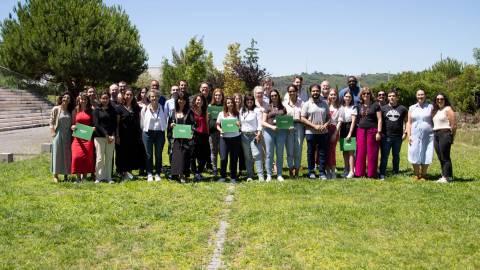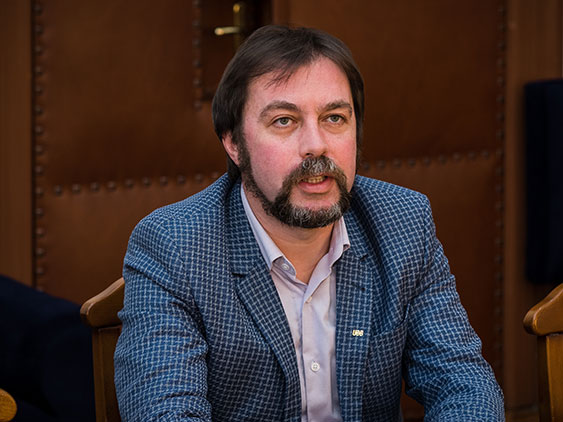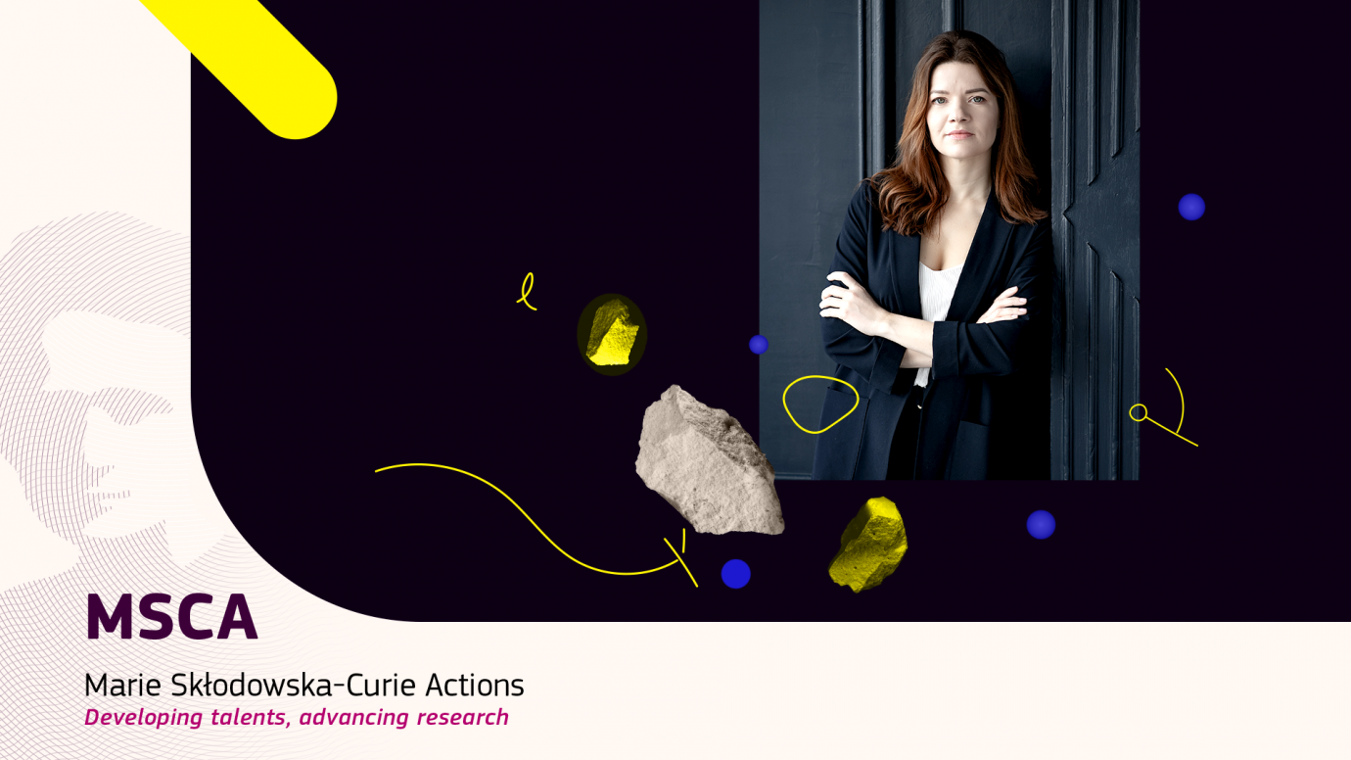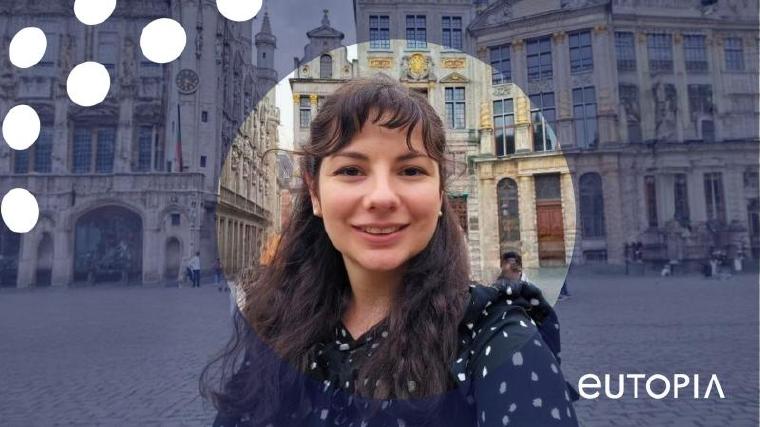EUTOPIA Doctoral Summer School: a very special summer school with an eye on the future

Go to content Navigation Direct access Connection

You are here :

Professor Bálint Marko is the Vice-Rector for Competitivity, Quality and Non-traditional Education at the University of Babeș-Bolyai, Cluj-Napoca (Romania). He is also a professor of Biology, specializing in Ecology. Currently, his work focuses on the field of Ecology. He is also the coordinator of the recently launched EUTOPIA_HEALTH project.
Can you provide an overview of the EUTOPIA_HEALTH initiative and its objectives?
EUTOPIA_HEALTH represents an initiative within the broader framework of Horizon, focusing on widening participation. Essentially, it entails collaboration where universities from non-widening countries assist those from widening countries to advance in specific areas. In our case, EUTOPIA comprises three widening members: Romania, Slovenia, and Portugal. Fortunately, these members have received support and training from non-widening members of the alliance. Our health consortium includes almost all alliance members, except TU Dresden. Notably, the University of Warwick participates as an associate member due to the UK's temporary inaccessibility to Horizon during submission. One of the primary goals of the project is to empower, rather than simply widen, alliance members by integrating various health-related domains. This involves enhancing both institutional and individual capacities. Consequently, activities under EUTOPIA_HEALTH will lead to institutional modifications at strategic levels and capacity building, along with boosting the individual capabilities of academic community members within the consortium. Another key objective is to challenge the traditional notion of health domains confined solely to Medical Sciences. The COVID-19 pandemic underscored the necessity of approaching medical issues comprehensively, requiring collaboration across diverse fields such as public health, health economics, environmental health, biology, and physics.
Why is health the domain of choice for a project that aims to give more visibility to the widening universities?
Following the COVID-19 pandemic, it has become evident that health is a multifaceted and intricate domain, extending beyond the confines of biomedical sciences. While it remains a primary focus area for the European Commission, its significance transcends mere priority status. Technological advancements and enhanced understanding of issues have underscored the necessity for collaboration across various scientific disciplines and among diverse stakeholders. Effective resolution of health-related challenges necessitates cooperation and the establishment of bridges for meaningful information exchange among different domains. Many non-widening countries have already integrated health-related scientific areas within higher education institutions. For instance, the University of Warwick and others have established schools of health that amalgamate diverse domains, demonstrating experience and capacity in integration. However, achieving such integration entails not only organizational restructuring but also the development of individual capacities. Researchers in the health field must comprehend the interconnectedness of various disciplines and leverage this understanding to their advantage. This requires an approach that is transdisciplinary and interdisciplinary, moving beyond isolated silos to address complex issues comprehensively.
The focus on health within the EUTOPIA alliance is intriguing, particularly considering the absence of dedicated Medical Colleges at partner universities, except NOVA Lisbon and UPF, Barcelona. What do you have to say about that?
The exchange is reciprocal. While it's true that certain universities already possess well-established institutional frameworks, I believe that by bridging these diverse institutional cultures and experiences, we can contribute not only to the development of widening countries but also, as is often overlooked, potentially enrich non-widening universities. It's essentially a two-way street; as we assist you, we also enhance our capabilities. This project operates as a mutually interactive endeavour, benefiting both parties. Although there may be some asymmetry, such as in cases where the contribution significantly boosts our capacity, as seen with UBB's lower rate of accessing European funds, this dynamic remains evident. We've documented statistics illustrating this in the project. By providing training to research managers and researchers, facilitating connections with other stakeholders, and involving them in various university workgroups, we enhance our institution's ability to secure funding opportunities.
Given that the project is in its early stages, could you elaborate on the framework regarding participants? Specifically, is it geared towards students, research scholars, or junior researchers? Who comprises the target population and actively participates in this initiative?
The target population is quite diverse, spanning various groups such as research managers and Tech Transfer Officers (TTOs) to early-career researchers. For enhancing institutional capacity, the focus primarily lies on early-career researchers, though it doesn't exclude other actors and stakeholders. The focal point here is to cultivate flexible career trajectories tailored to the needs of early-career researchers, recognizing their pivotal role in shaping the future of research. Moreover, the initiative extends its reach to stakeholders within the health innovation ecosystem, aiming to forge connections with universities. This collaborative approach ensures that knowledge exchange flows seamlessly between academia and industry, fostering a more robust innovation landscape. Students are integral to this dynamic as well, actively participating in events such as Health Days and Science Cafes. Their engagement serves not only as an audience but also as contributors to the dialogue, enriching the learning experience for all involved. The project's integrative ethos transcends disciplinary boundaries, encompassing administrative, academic, and student perspectives. By deliberately assembling a diverse team comprising individuals from various fields, the initiative embodies the interdisciplinary spirit it seeks to promote. At UBB, for instance, the management team comprises individuals from diverse backgrounds such as chemistry, environmental science, public health, psychology, and biology, to ensure an integrative approach. This mirrors the broader goal of creating bridges across different domains, exemplified by the UBBMAD framework program. The project aims to scale up these integrated outcomes effectively. By fostering inclusivity and integration across different stakeholders and domains, the initiative aims to catalyze transformative change within the research landscape, driving progress and innovation forward.
It’s a constantly changing world that we live in, and we face newer health challenges each day. How does an initiative like EUTOPIA_HEALTH build the bridges between the challenges of creating awareness or delivering a cure to society?
Indeed, as a biologist, my focus may be on developing a cure or vaccine for a particular ailment, which is an exciting prospect. However, the process doesn't end there. If I intend to bring this solution to the masses, I encounter additional challenges. Firstly, there's the issue of production, a domain that falls beyond my expertise as a biologist. Secondly, there's the crucial matter of effectively communicating the benefits and importance of the vaccine to the public. COVID-19 has starkly demonstrated that this task goes far beyond mere advertising; it necessitates a comprehensive strategy for raising awareness and addressing public health concerns. This leads to the third challenge: the need for public health specialists who can navigate and address the broader health implications and concerns associated with vaccine distribution and acceptance. Lastly, there's the aspect of health economics. It's essential to ensure that the plans for production, distribution, and communication of the vaccine are not only feasible but also economically sustainable. This involves considering factors such as the cost-effectiveness of the vaccine and the logistics required for large-scale production and distribution. Thus, the endeavour ultimately involves navigating complex logistical and economic considerations alongside the scientific aspect of vaccine development.
What do the mobility and interdisciplinary connectivity in this ambitious project offer young researchers?
There are essentially two narratives at play here. One aspect is that by joining this project as a chemist affiliated with UBB, you have the opportunity to establish connections with professionals from diverse fields, such as environmental science in Gothenburg, psychology in Cergy, or bioinformatics at Pompeu Fabra. This integration allows you to become part of a broader network within the university, facilitating interdisciplinary collaborations. As a scientist within this alliance, your expertise becomes interconnected across various domains, enabling you to enhance and diversify your skills. Consequently, this empowers you to explore career pathways and areas of expertise that may have previously been beyond reach due to knowledge or geographical constraints.
This project is one way in which you are brilliantly using interdisciplinarity. It's not just limited to one family of disciplines; rather, it’s integrating disciplines with all their relevance and bringing them together. How do you think a project like EUTOPIA_HEALTH can transform the academic landscape in the European higher education ecosystem?
I believe a potential outcome could be the introduction of topics that were previously beyond our reach due to limitations in knowledge and understanding of other domains. While acknowledging the existence of individuals with such expertise, it's evident that silos still exist. We aim to expand our capacity in this regard, fostering the integration of diverse perspectives. This expansion enables the introduction of new and innovative approaches, not only in research but also in knowledge transfer. Recognizing the value of interdisciplinary and transdisciplinary approaches is crucial for fostering innovation within our broader ecosystem. As someone involved in university leadership, I see this as a model example, not limited to health alone. Issues like the climate crisis also demand multidisciplinary solutions. By embracing this mindset, we can encourage innovative thinking across various domains beyond health. There are numerous issues where the involvement and collaboration of specialists from diverse fields are essential.
Can you share some details about the timeline of this EUTOPIA_HEALTH project, and what are the key milestones that are set to be met in the meantime?
The project spans over five years and is marked by several significant milestones, although I won't delve into listing them all here. One primary objective is to explore the synergies present within our health-related agenda. This involves identifying common ground and connections between different areas of focus, fostering collaboration, and maximising impact. Another crucial aspect of the project involves the creation of a mobility roadmap. This isn't just a simple logistical plan for researchers to move between institutions within the alliance. Instead, it's a comprehensive guide that includes essential information such as taxation and social security considerations. Given the varied legal frameworks across the European Union, such details are crucial for facilitating seamless mobility and ensuring researchers' well-being as they navigate different jurisdictions. Furthermore, a key focus of the project is creating flexible career pathways for early-career researchers. Traditionally, researchers have been bound by rigid disciplinary boundaries, which can limit their opportunities for growth and collaboration. However, we aim to break down these barriers by valuing interdisciplinary work and collaborations. For example, we recognize the importance of publications and collaborations that transcend specific disciplines, thereby allowing researchers to explore new avenues and expand their horizons. In addition to these strategic objectives, the project also encompasses various training initiatives. We provide specialized training for research managers and tech transfer officers, equipping them with the skills and knowledge necessary to navigate the complex landscape of research and innovation. Moreover, we offer opportunities for young researchers to participate in short-term mobilities within the consortium. These experiences expose them to diverse research groups and perspectives, enriching their understanding of the broader research landscape. Ultimately, the overarching goal of the project is to drive excellence in research and innovation. To this end, we have established a mechanism for providing seed funding to interdisciplinary research groups. While publication isn't a strict requirement for receiving this funding, we do expect tangible outcomes that contribute to the advancement of knowledge in their respective fields. In essence, the project serves as a test bed for nurturing innovation and collaboration within the research community. By fostering interdisciplinary approaches and providing support for researchers at all career stages, we aim to create a dynamic and inclusive research ecosystem that drives meaningful progress and impact.
What do you have to say to the EUTOPIA community about the EUTOPIA_HEALTH project?
I believe the fundamental message of the project or its underlying concept is that solving societal problems requires collaboration from diverse sources. It's essential to demonstrate to our students, which I consider to be a crucial message, that knowledge isn't solely confined to one's field of study. It's equally important to cultivate an understanding and appreciation for other disciplines. By valuing the skills and expertise of others, we can enhance our problem-solving capacity. This approach may seem complex to articulate simply, but it essentially emphasizes the importance of interdisciplinary collaboration in tackling complex issues. For me, this message is paramount to convey to my students: appreciate the contributions of other domains and integrate them into your problem-solving process. By combining diverse perspectives with your accumulated knowledge, you can achieve innovative solutions beyond what is currently achievable. This ethos of collaboration, mobility, and interdisciplinarity lies at the heart of EUTOPIA. Through experiences in various fields, we gain a deeper understanding of ourselves and our surroundings. This diversity not only enhances our institutional performance but also enriches our understanding of the world. Ultimately, the project's value extends beyond its tangible outcomes; it embodies a broader message emphasising the importance of collaboration and understanding across disciplines.
Know more about EUTOPIA_HEALTH Project.



